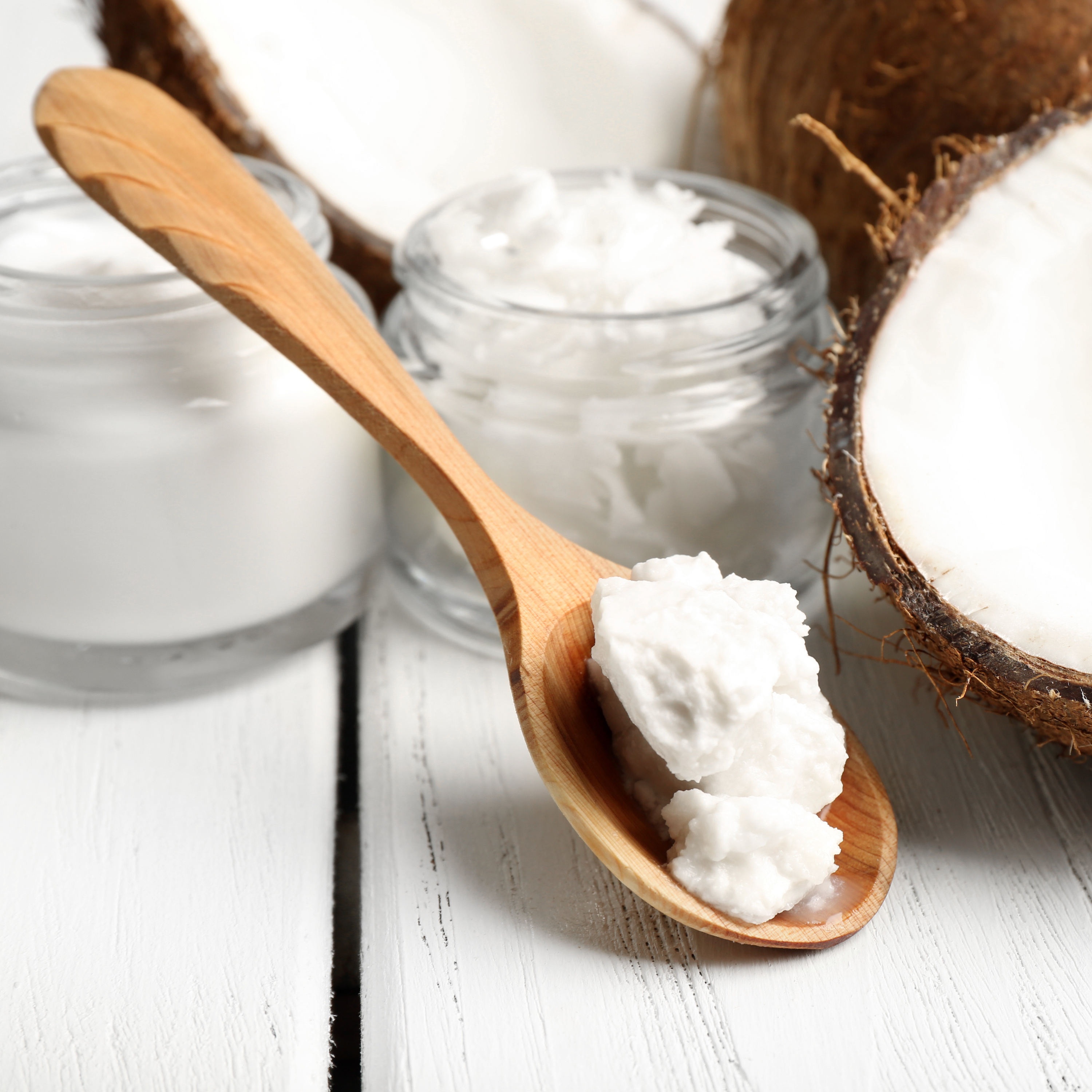Deciding how to eat healthily today can be very tricky, unless you’re trained in physiology, nutrition, and the connections between the two. Just when you thought you had it kinda figured out on fat, you’re left even more confused than you were before upon the recent headlines slandering coconut oil. Before throwing the baby out with the bathwater, or start drinking the Kool-Aid of the perpetual War On Fat fueled by questionable and biased proponents, please read on.
First, let’s state the obvious — the media loves and willingly highlights controversy and confusion because it sells. And this recent controversy over coconut oil is no exception. Like everything else, the media gobbled up the sensational headlines from the American Heart Association (AHA) and spit them back at you like used bubblegum — in a short, dumbed down, and not-so-sweet summary. Many people probably read it, went home and tossed their $10 jar of coconut oil in the trash. Needlessly.
Second, reporting on research in nutrition leaves much to be desired. The AHA seems to take advantage of the fact that most people aren’t able to critically break down the science behind the recommendations. This organization has historically selectively crafted arguments from a specific and convenient pool of data that supports their previous argument: that cholesterol (LDL-C) values should be a central focus in the monitoring of heart disease, and that reducing saturated fats is a primary dietary intervention that achieves this goal. But the diet-heart theory doesn’t stand up very well to the more recent research on it. (For another perspective on this big topic, check out this article.)
The headlines and subheadlines highlighting research conclusions in the media are often taken at face value, particularly in this culture with an increasingly short attention span. Why read the whole article when the title already tells you the punch line? I appreciate that we have nationwide releases on research that keep people up to date, but keep in mind that they’re not necessarily fact as they’re presented to you through the media. In the words of Arthur Kornberg, “Half of what we know is wrong. The purpose of science is to determine which half.” It’s a good rule of thumb that with whatever you hear promoted, keep a healthy edge of skepticism – even when the research supports your own established point of view. Which is a tall order for many people.
Third, facts and figures can easily be manipulated to support a predetermined point of view (or investment). There have been 17 newer systematic reviews and meta-analyses done that have NOT found a clear link between saturated fat and heart disease (many of those are found here). The AHA hand-picked 4 core studies from these meta-analyses that they deemed most “well-performed” to base their recommendations on. But all 4 of these studies highlighted in the review were done 40 years ago (in 1968, 1969, 1970, and 1979). Should we really be basing our current nutritional recommendations on 40-year-old data?
Much of the AHA’s arguments against saturated fat (and specifically coconut oil here) are built around observed changes in LDL cholesterol levels (LDL-C) measured in blood. Daily LDL-C levels can naturally fluctuate significantly (even without intervention). In practice, this means you could have your cholesterol measured Monday and be told you are in good health, and then have it retested Tuesday and be prescribed lifelong cholesterol-lowering drugs due to a natural variation in your blood levels. This data doesn’t bode well for LDL-C. A recent study showed that nearly 75% of patients hospitalized for a heart attack had cholesterol levels that would indicate they were not at high risk for a cardiovascular event, so it’s reliability as a predictor is questionable. Also, the AHA’s report rests some of their argument on animal models, which do not have the same dense energy and fat demands as that of the large human brain. Research has shown that dietary cholesterol has a significant impact on the blood levels of cholesterol in animals, but many experiments have shown that it’s impact is minimal on humans.
Cholesterol is a natural and normal part of human physiology, and you need it (in balance) for optimal overall health. The connection between dietary cholesterol intake and blood cholesterol levels is complicated. Around 85% of the cholesterol in blood circulation is manufactured by the body in the liver, and is not coming directly from the cholesterol that you eat. Long-term studies have failed to show an association between saturated fat intake and blood cholesterol levels. Certain dietary saturated fats even have some important health benefits (including huge amounts of essential fat-soluble vitamins like K2, A, and D, among others). Coconut oil has some special health benefits too due to its unique fat composition. In the context of a healthy plant-focused, low sugar, fiber-rich diet, saturated fats are very beneficial.
To be clear though, the new American Heart Association guidelines aren’t telling people to avoid saturated fats altogether to reduce heart disease risk. They’re still saying that up to 2 tablespoons of coconut oil or saturated fat isn’t necessarily terrible for some people. But the AHA would also have you reduce those nutrient-dense saturated fats (like butter and coconut oil) and replace them with with highly processed, pro-inflammatory corn, soy, and vegetable oils and increase your carbohydrate intake instead. The continued acceptance of the outdated low-fat, high-carbohydrate dietary approach may really be worsening our collective health, rather than preventing high cholesterol and heart disease. I would recommend steering very clear of corn, soy, vegetable oils, and processed carbohydrates if you want to avoid heart disease.
The discussion on heart disease keeps on returning to saturated fat, instead of the more problematic staples of the standard American diet that promote inflammation: hydrogenated and processed vegetable oils, refined grains, and sugar. To understand the relevancy of this controversy surrounding nutrition recommendations for heart health, you must be aware of the controversial political history of the food industry duel between fat and sugar. You should also be aware that the food industry has significant, continued influence over nutrition science and recommendations today. And while the AHA is a nonprofit organization, the receive significant funds from industry leaders who benefit from reports that continue to put the blame on saturated fat.
Did you know that in February 2015, for the first time in 35 years, the U.S. Dietary Guidelines Advisory Committee sent new recommendations to the government on fat intake – without any upper limit on the total fat intake? The fact is we need a variety of fats, including saturated fat. We are omnivores, and many cultures have thrived for millennia on diets high in good quality saturated fat. In the context of a plant-rich, high-fiber diet and an active, non-smoking lifestyle, quality saturated fats support good energy levels, proper satiety, healthy hormones, gut and immune health, healthy metabolism, and much more. Proper nutrition is a key component in preventing heart disease, but focusing on reducing saturated fats in the diet to achieve that goal isn’t supported by the majority of current data. So can the media please stop scaring people about dietary fat? We need to shift our focus to avoiding corn, soy, and vegetable oils, refined grains, and sugar (the real problems in the standard American diet.) You have more control with your daily choices than you think (or have been lead to think) in preventing heart disease.
In my experience, most people need to get sufficiently uncomfortable with their status quo in order to make changes for their health. And therein lies the problem with preventing heart disease: for many, it’s a relatively asymptomatic disease with a very slow progression. I consult with tired and overwhelmed young moms who want their mojo and vitality back. Our food choices can either feed health and energy, or fuel disease and fatigue, which is why nutrition is so key. But the beautiful thing is that the diet that fuels energy now is much like the diet that prevents heart disease down the road. The benefits of a healthy diet are layered and broad-reaching, and this needs to be emphasized when we discuss nutrition. As a culture, we are in dire need of understanding food as medicine. Food can truly hurt or heal, and just as with any other medicine, it demands respect and moderation. We need to stop allowing heavy political and financial interests and attention-hungry media rule our dietary guidelines. We should be empowering people to understand and properly balance fats (including saturated fat) because they are essential for our current health and energy, and for preventing heart disease down the road.







Leave A Comment